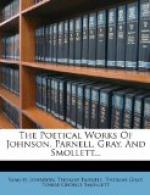the man. It is slipshod, easy, and pleasing.
If the distinguishing quality of poetry be to give
pleasure, then Parnell is a poet. You never thrill
under his power, but you read him with a quiet, constant,
subdued gratification. If never eminently original,
he has the art of enunciating common-places with felicity
and grace. The stories he relates are almost
all old, but his manner of telling them is new.
His thoughts and images are mostly selected from his
common-place book; but he utters them with such a natural
ease of manner, that you are tempted to think them
his own. He knows the compass of his poetical
powers, and never attempts anything very lofty or
arduous. His “Allegory on Man,”—pronounced
by Johnson his best,—seems rather a laborious
than a fortunate effusion. His “Hymn to
Contentment” is animated, as the subject required,
by a kind of sober rapture. His “Faery
Tale” is a good imitation of that old style
of composition. His “Hesiod” catches
the classical tone and spirit with considerable success.
His “Flies,” and “Elegy to the Old
Beauty,” are ingenious trifles. His “Nightpiece
on Death” has fine touches, but is slight for
such a theme, and must not be named beside Blair’s
“Grave,” and Gray’s “Elegy
written in a Country Churchyard.” His translations
we have, in accordance with the plan of this edition,
omitted—and, indeed, they are little loss.
His “Bookworm,” &c., are adaptations from
Beza and other foreign authors. By far his most
popular poem is the “Hermit.” In it
he tells a tale that had been told in Arabic, French,
and English, for the tenth time; and in that tenth
edition tells it so well, that the public have thanked
him for it as for an original work. Of course,
the story not being Parnell’s, it is not his
fault that it casts no light upon the dread problems
of Providence it professed to explain. But the
incidents are recorded with ease and liveliness; the
characters are rapidly depicted, and strikingly contrasted;
and many touches of true poetry occur. How vivid
this couplet, for instance—
“Slow creaking turns the door with
jealous care,
And half he welcomes in the shivering
pair!”
How picturesque the following—
“A fresher green the smiling leaves
display,
And, glittering as they tremble,
cheer the day!”
The description of the unveiled angel approaches the
sublime—
“Fair rounds of radiant points invest
his hair;
Celestial odours breathe through purpled
air;
And wings, whose colours glitter’d
on the day,
Wide at his back, their gradual plumes
display.
The form ethereal bursts upon his sight,
And moves in all the majesty of light.”
A passage of similar brilliance occurs in “Piety,
or the Vision”—
“A sudden splendour seem’d
to kindle day; A breeze came breathing in; a sweet
perfume, Blown from eternal gardens, fill’d
the room, And in a void of blue, that clouds invest,
Appear’d a daughter of the realms of rest.”
Such passages themselves are enough to prove Parnell
a true poet.




